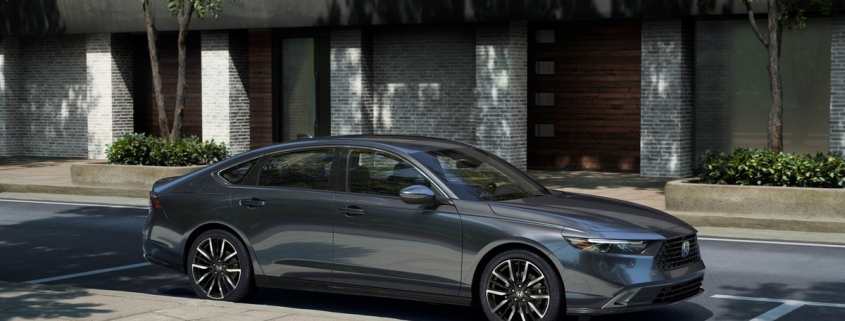Road Test: Honda Accord
There is no need to tell you that midsize sedans are not what they used to be. In fact, I find them to be better than they were in the past, but since almost no one buys them anymore, they have completely fallen into oblivion. The Honda Accord may be one of the biggest losers in all of this, as not only has it been overshadowed by the massive shift in the market towards SUVs, it has also always been in the shadow of the Toyota Camry.
Honda Canada has recently decided to simplify its offering by offering its midsize sedan. While there are more than a dozen variations on the Civic side, the Accord is only available in one model, offered in three versions: base, Sport hybrid, and Touring Hybrid.
No Accord Coupe, obviously, nor a V6 engine version, which goes back several years. Instead, there is a base turbo 4-cylinder and a hybrid 4-cylinder for the other two variants.
It’s the same strategy, and these are actually the same engines found under the hood of the CR-V, which is a sign of the times. In the past, the CR-V was often referred to as the “Civic of SUVs,” but clearly, it has risen in status while the Accord has remained relatively unchanged.
Under the hood, you have the choice between a 1.5-liter turbo 4-cylinder engine producing 192 horsepower, or a naturally aspirated 4-cylinder engine paired with an electric motor that delivers a peak power of 204 horsepower. All of this power is transmitted to the front wheels through a continuously variable transmission (CVT) that, let’s be honest, is configured to behave much like an automatic transmission with eight or nine speeds. When accelerating, you can feel slight jerks resembling gear shifts. It’s very smooth and subtle, but it may appeal to those who dislike CVT transmissions.
And this allows for maintaining an average fuel consumption of just under 7 liters per 100 kilometers.
All of this combined results in an extremely smooth behavior, reminiscent of the Accord in its heyday: a Japanese midsize sedan that isn’t exactly luxurious, but very refined. The steering is just light enough and the suspension just cushioned enough to create a sense of comfort and security which, even today, despite all that is said about midsize sedans, make the Accord one of the most enjoyable vehicles to drive on the market.
Which, of course, would be wonderful if that were the end of the story. But it’s not.
Because there are a few drawbacks that come with all of this. Starting with the price. This is the same issue for the CR-V: the hybrid version is too expensive. It’s probably a sign of the times, but justifying a hybrid Accord at $44,000 or $47,000 compared to a regular Accord at $39,500 is tough.
Especially since on the inside, it’s slightly better finished and slightly more elegantly adorned, but the experience is not significantly enhanced by the multimedia system and trim to justify the premium.
Everything is comfortable, even the rear bench seat, capable of accommodating three tall teenagers. The trunk is quite useful, despite the sloping roof which slightly reduces its cargo volume.
But for that price, one can find vehicles that are either more practical, less thirsty, or more modern elsewhere in the market.
It’s sad for the Honda Accord, a model that deserves better than being relegated to the shadows of SUVs and the Camry…again and again.
The text Road Test: Honda Accord is from Automobile Yearbook – Automotive News



